Hi FAC Members,
The goal of our first Wildfire Wednesday newsletter was to provide curated resources to New Mexicans despite social distance. We have seen positive strides toward this goal. Thank you all for continuing to help grow this network and to share this information with your friends and loved ones. We are truly stronger together.
This edition of Wildfire Wednesday includes:
A webinar by Sarah McCaffrey focused on what motivates homeowners to mitigate fire risk
A look into the connection between invasive species and fire ecology
An article describing how increasing wildfire risk is agreed upon across political lines
Upcoming webinar tomorrow on wildfire response and recovery
Sincerely,
Gabe
What Motivates Homeowners to Mitigate Wildfire Risk?
USFS Research Social Scientist, Sarah McCaffrey
If you watch one webinar recording about wildfire preparedness this year make it last week’s keynote address from The Bill Lane Center for the American West, where Sarah McCaffrey takes an informed look at how landowners respond to outreach for wildfire mitigation. This webinar looks past “the imagined public” and uses rigorous social science methods to investigate what actually motivates homeowners to mitigate wildfire risk.
To view the webinar recording and learn how to improve your outreach to homeowners, click here.
Invasive Species and Fire Risk
Fire ecology investigates the complex strategies of flora and fauna employ to survive wildfire. We commonly think of ponderosa pine trees that grow thick bark to resist the impacts of fire. A deeper investigation though shows that these trees not only just survive fire but also perpetuate more fire by dropping flammable needles that allows fire to spread.
A wildfire moves through tamarisk (salt cedar).
In contrast other species like Cottonwoods that grow along rivers or sage brush on plateaus have different less harmonious relationships with fire. In these areas fires occurred much less frequently for many reasons but in part because the leaves that drop from sage and cottonwoods are less flammable than ponderosa needles.
Now invasive species have changed this equation. In the case of sage ecosystems, cheatgrass has moved in. Cheatgrass is very flammable and will quickly recolonize an area after a fire, long before sage has a chance to reestablish. There is a similar story occurring in our bosques where invasive species such as tamarisk and Russian olive trees that are very flammable have invaded areas, and changed the fire ecology by adding fuel to the system, leading to fires that cottonwoods are often unprepared for.
Cheatgrass is an invasive species that often out competes native species and is highly flammable.
In both cases there are diligent restoration efforts occurring across the US to restore these ecosystems. However, make sure to take a look right around your home or property too. Just as these flammable invasive plants threaten our iconic sage flats and cottonwood galleries, they also are a wildfire threat near your home.
Cheat grass advice from Waterwise LLC in Santa Fe
The 2017 Eagle Creek Wildfire in the Columbia River Gorge
Common Ground: Agreement on Increasing Wildfire Risk Crosses Political Lines
A recent article from the Blue Mountain ecoregion in Northeastern Oregon provides useful insight into how political views may create a stumbling block for forest and fire management and suggests alternative ways of communicating the need for wildfire mitigation.
Despite overwhelming scientific and experiential data, climate change remains a divisive factor in forest and fire management. Beliefs about climate change are found to be strongly linked to a person’s political leanings. However, beliefs about future wildfire risks were found to be largely independent of political beliefs and people accurately agree about the rising frequency of large wildfires and expect this trend to continue. This finding presents an opportunity to engage diverse stakeholders in developing policies to mitigate increasing wildfire risk without invoking politicized beliefs about climate change.
To learn more about these findings, click here.
Tomorrow: Virtual Wildfire Series: Webinar on Response and Recovery
Jul 9, 2020 03:30 PM
The Bill Lane Center for the American West is hosting a panel discussion on the human dimensions of wildfire response and recovery during the COVID-19 pandemic. Our panelists Luke Beckman from the Red Cross, Alma Bowen from Nuestra Comunidad, and Charles Brooks from the Rebuild Paradise Foundation will discuss the challenges and best practices for evacuations, shelters, planning and coordination, and recovery efforts in our new reality.
https://west.stanford.edu/events/virtual-wildfire-series-response-and-recovery




